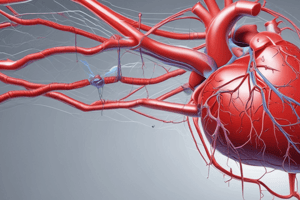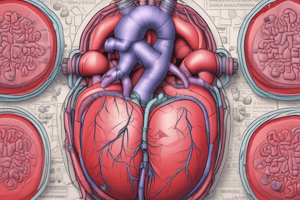Podcast
Questions and Answers
What is the primary mechanism of action of ACE inhibitors?
What is the primary mechanism of action of ACE inhibitors?
- Enhance preload and afterload
- Promote vasoconstriction
- Inhibit the formation of angiotensin II (correct)
- Increase the production of angiotensin II
Which cardiovascular system hormone is inhibited by ACE inhibitors?
Which cardiovascular system hormone is inhibited by ACE inhibitors?
- Aldosterone
- Angiotensin II (correct)
- Norepinephrine
- Renin
What are some common cardiovascular diseases managed by ACE inhibitors?
What are some common cardiovascular diseases managed by ACE inhibitors?
- Asthma and COPD
- Hypertension and heart failure (correct)
- Hypothyroidism and diabetes
- Osteoporosis and arthritis
Which of the following is NOT a typical side effect of ACE inhibitors?
Which of the following is NOT a typical side effect of ACE inhibitors?
What is the main effect of ACE inhibitors on blood vessels?
What is the main effect of ACE inhibitors on blood vessels?
Which system in the body produces angiotensin II?
Which system in the body produces angiotensin II?
What is the role of angiotensin II in the body?
What is the role of angiotensin II in the body?
How does stasis contribute to thrombosis?
How does stasis contribute to thrombosis?
What is the most significant effect of turbulent blood flow on endothelial cells?
What is the most significant effect of turbulent blood flow on endothelial cells?
In the context of thrombus formation, what role does hypercoagulability play?
In the context of thrombus formation, what role does hypercoagulability play?
Why do ulcerated atherosclerotic plaques contribute to turbulence?
Why do ulcerated atherosclerotic plaques contribute to turbulence?
How does ventricular remodeling post-myocardial infarction relate to thrombosis?
How does ventricular remodeling post-myocardial infarction relate to thrombosis?
How does overt loss of endothelium contribute to thrombosis?
How does overt loss of endothelium contribute to thrombosis?
What insults can induce endothelial dysfunction leading to thrombosis?
What insults can induce endothelial dysfunction leading to thrombosis?
How does dysfunctional endothelium contribute to thrombosis?
How does dysfunctional endothelium contribute to thrombosis?
How does abnormal blood flow turbulence contribute to arterial and cardiac thrombosis?
How does abnormal blood flow turbulence contribute to arterial and cardiac thrombosis?
What role does stasis play in the development of venous thrombi?
What role does stasis play in the development of venous thrombi?
Flashcards are hidden until you start studying
Study Notes
Cardiovascular Pharmacology: Focus on ACE Inhibitors
The term 'cardiovascular pharmacology' refers to the branch of medicine that deals with the study of drugs that affect the cardiovascular system. One of the critical aspects within this field is understanding the mechanisms of angiotensin-converting enzyme (ACE) inhibitors. These agents play a crucial role in managing various cardiovascular diseases, particularly hypertension, heart failure, and myocardial infarction.
ACE inhibitors are a group of medications that inhibit the formation of angiotensin II, a powerful vasoconstrictor hormone produced by the renin-angiotensin-aldosterone system (RAAS). By reducing the level of angiotensin II, these inhibitors promote vasodilation and decrease preload and afterload, leading to improved blood flow and cardiac performance.
Some notable examples of ACE inhibitors include captopril, enalapril, lisinopril, and ramipril. These drugs can be categorized into different types based on their chemical structures: sulfonylureas, benzothiazapes, and phosphonates. Each type has distinct characteristics such as bioavailability, duration of action, and metabolism.
Although ACE inhibitors have a relatively low incidence of side effects, some patients may experience unwanted effects such as dry cough, hypotension, angioedema, and hyperkalemia. Moreover, these medications are contraindicated in certain situations, like severe aortic stenosis, severe hyperkalaemia, symptomatic hypotension, renovascular hypertension, pregnancy, and moderate renal insufficiency.
In conclusion, ACE inhibitors represent a vital component in cardiovascular pharmacotherapy, with their unique ability to modulate the RAAS pathway and contribute to improved outcomes in various cardiovascular diseases.
Studying That Suits You
Use AI to generate personalized quizzes and flashcards to suit your learning preferences.




